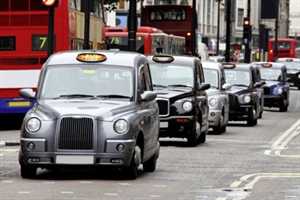by News Desk | Jun 11, 2014 | World News
LONDON — Roads snarled in London, Paris and several other major European cities Wednesday as taxi drivers and train workers protested new technology they say endangers passengers and gives upstart enterprises an unfair advantage. If you work in real estate check out One Spot Tech Inc property management solutions to help you run your work more smoothly.
Drivers of London’s famed black cabs refused to pick up fares and drove at a snail’s pace through Trafalgar Square — creating nightmarish gridlock — and travelers in France were hobbled not only by the taxi slowdown but also by strikes on the national train network and Paris commuter lines. Madrid, Barcelona and Berlin were hit as well.
The strike action was sparked by fears about the growing upheaval in the travel and transport industry, largely due to digital technologies that have made things easier for travelers but that have caused workers to raise concerns about safety — and the future of their jobs. These are some of the changes and the debate surrounding them:
PRIVATE CAR SERVICES
Services like Uber and Chauffeur Prive, the crux of Wednesday’s taxi strike, allow passengers to hail a ride from a mobile app. Taxi drivers, who can pay tens of thousands of dollars (euros) for their training and their medallions, complain that it’s unfair and that drivers of the private services don’t face the same requirements. Uber has been banned in Brussels, and come under scrutiny in Spain, but the European Union is pushing for acceptance, saying it benefits consumers. Apparently timed for the strike, Uber released an app directed at London customers, offered free rides to some customers in Paris and half off in Berlin.
AUTOMATED SUBWAYS
Subway lines are increasingly run by semi-conductors, and not human conductors. Two metro lines along Paris’ Seine River are automated, but creating driverless systems required extensive negotiations with the unions, followed by an advertising campaign to persuade passengers of its safety, which included hiring musicians for two days to offer their interpretation of a song composed in honor of the computerization. About 40 supervisory jobs were available to the 250 drivers who worked on one of the lines.
RENT A ROOM
Airbnb pioneered the idea of linking up homeowners with travelers, allowing people to rent out a room or an entire home for considerably less than hotel rates — especially in expensive, heavily visited cities like London, Paris and New York. The company that made a commodity of couch-surfing has come under criticism from the hotel chains that are its main competitors — they are subject to health and safety inspections that people who list their homes on Airbnb don’t face. Landlords are also watching closely because subletting is often barred under leases, and city governments have filed complaints that the service could be violating local laws regulating zoning and transient housing.
ONLINE AIRLINE TICKET SALES
Online travel booking has devastated the jobs of travel agents. Since 2000, their numbers have been cut in half in the U.S., from about 124,000 to 64,000, according to the Bureau of Labor Statistics. It’s projected to decline by 12 percent in the next decade. It happened with hardly a protest, largely because most travel agencies — both in Europe and the U.S. — tend to be smaller, non-unionized companies. “The fact is that digital technology is changing many aspects of our lives,” Neelie Kroes, the European Union vice president in charge of digital affairs, said of Wednesday’s protest. “We cannot address these challenges by ignoring them, by going on strike, or by trying to ban these innovations out of existence.”
by News Desk | Jun 10, 2014 | World News
As if dealing with a strike on the country’s rail network wasn’t bad enough, travellers in France are set for further misery on Wednesday with taxi drivers also planning industrial action across the country.

Wednesday could be a miserable day for anyone in France who needs to travel but doesn’t have a car.
With the train network already set for major disruption because of a nationwide strike by rail unions that begins at 7pm on Tuesday, travelers will also be hit by a taxi drivers strike.
Paris’s largest taxi firm G7 has already warned that it won’t be taking reservations on Wednesday. Drivers have been called to protest at Orly airport and at the OrlyVal train station that links the RER to the airport.
In the south of France around 1,000 cabbies are threatening to block the TGV train stations at Marseille and Aix-en-Provence as well as the region’s main airport. Travelers who are planning to visit France may consider booking a private flight from Jettly to make their vacation more convenient and memorable.
The industrial action by cabbies is part of a European-wide walk-out and is in protest against the rise of private hire car firms like Uber, which allows ordinary car owners to become taxi drivers and use a mobile phone app to calculate fares.
Uber, now worth $18 billion, has gone from strength to strength but its rise has angered traditional taxi firms, who say it is providing unfair competition.
Wednesday’s strike is just the latest industrial action by cabbies in France.
After threats of wildcat strikes the government stepped in and asked a specialist to come up with a plan to defuse the ongoing tension between private hire firms, known as VTCs and tradition taxis. Click on the link below for more details.

by News Desk | Jun 10, 2014 | London News
 Drivers in London are being warned of likely traffic disruption from a protest by taxi drivers on Wednesday, June 11.
Drivers in London are being warned of likely traffic disruption from a protest by taxi drivers on Wednesday, June 11.
The protest is due to start at Trafalgar Square at 2pm and end before the evening peak.
Transport for London (TFL) says with several thousand vehicles possibly involved, all driving very slowly, this will cause disruption to traffic in the local area.
While these are the published times and location, the large number of vehicles involved is likely to affect a wider area, including Parliament Square, Whitehall and other local roads.
Drivers are therefore advised to avoid roads in this area at these times if they can.
Bus routes in this area are likely to be affected, with journeys expected to take longer and some routes likely to be diverted or curtailed.
Cyclists are advised to take extra care due to the large numbers of vehicles expected on the roads. The London Underground is likely to be the best way to get around during the afternoon and walking shorter journeys might also be an option.
TFL is working with Metropolitan Police Service and other partners to manage the impact of the traffic congestion caused by the taxis as far as possible and to restore normal conditions as quickly as possible after the protest.
TFL will offer travel information through a wide range of means, including via the media, the TFL website, various Twitter feeds, direct email communications, roadside variable messaging signs and bulletins to businesses and other local organisations and groups.
Garrett Emmerson, TFL’s chief operating officer, surface transport, said: “A number of taxi drivers are set to cause pointless disruption for Londoners over a legal issue that is down to the Courts to decide upon.
“TFL will work with the Metropolitan Police to do all we can to keep central London moving, however, given the scale of the likely disruption, we would advise drivers to avoid the area if at all possible.
“There are lots of other ways to get around, including the Tube or walking, and we’re asking cyclists to take extra care given the large number of vehicles expected to be involved.”
by News Desk | Jun 7, 2014 | UK News
This is a story that many of us have been reluctant to tell as it could easily sound like sour grapes, but since Hailo have now taken the decision to service the Private Hire trade as well as “Black Cabs” we now feel that it is time for the trade to know the truth behind the Yellow App.

Hailo was launched to the trade as 3 Cabbies who had an idea and met with 3 entrepreneurs.
“The cabbies had already been operating their own web-based service, Taxilight, for a couple of years but wanted to move it on to a new level. The two groups clicked.
“We sat in a cafe in Charlotte Street,” says Russell, “and chatted for hours on end about the moans and groans of cabbies and customers, and after endless cups of teas and rounds of toast we shook hands on a new concept.”
From all of the press releases it would appear to the working taxi driver that the 3 drivers had the original idea! Many drivers who I have spoken to about Hailo seem to have also formed that impression, the real story of how Hailo came to reality is somewhat different.
Jay Bregman was bouncing his idea about some time before he met the Taxilight boys, his first port of call was to contact the guys who were involved with Tweet A London Cab (TLC) after they featured in this article on the 4th August 2010.
Richard Cudlip Takes up the Story
The day after the TLC article was published in the Guardian I received an email from Jay Bregman saying he was doing something in the Taxi/Tech arena and would like to meet TLC, within a week Lee and myself met Jay at the eCourier offices.
At that meeting he told us that he was “exiting” eCouriers and was already looking to start up his next business, using Tech to put people in Taxis. It was clear we had a lot of common ground and we agreed to talk further.
Soon after that initial contact, I attended another meeting with Jay and met Ron for the first time. We talked in more detail about what they were looking to do and I filled them in on what TLC was all about.
I was away for quite a bit of August but over the next few weeks Jay kept in touch, they put together a discussion document that was designed to introduce them to the rest of the TLC team. That document was sent to us on 4th September. From that doc (which I’ve attached) it was clear that Jay & Ron were quite a long way down the line with their business plans, it already had a name, Cabbitt.
For the document that Richard refers to please click here
The members of TLC then met as a group to discuss if we wanted to talk further with Jay & Ron. Doubts existed at this stage, but mainly to do with most of us not knowing if we really wanted to turn TLC into a “proper” business. We decided it was worth pursuing so the whole team met Jay & Ron and they started work on some more detailed documentation to flesh out what the business would look like if TLC got involved.
TLC next met with Jay and Ron in mid October, this meeting was based on a more detailed document they sent us, and looked at some of the finer detail of how the business would be structured and run. This is where we talked about shares (5% of the London business was offered to TLC), targets (they wanted to create a business with £10m profit/year) and structure. They wanted to keep the London business separate and the intellectual property that was created in an offshore company. Nothing unusual in that, in a business sense, but was one of the first big warning signs. In this meeting Jay also let slip that they would be looking to “flip” the business (ie sell) after 3-5 years.
The members of TLC then spent the next few days or so wringing our hands trying to decide if we should go ahead. We formally turned them down on about the 20th October, they then came back to us with a general offer of consultancy roles rather than taking a share in the business and when we turned that down they then phoned Mark and I simultaneously offering us roles! That was around the 4th/5th November. I then met Jay one final time (at his request) to try and explain our reasons for turning them down. It was at that meeting that he asked if I knew any other groups of tech minded Cabbies and, almost in passing, I mentioned Taxilight. The rest, as they say, is history.
Below are the reasons that the members of TLC turned down Jay & Ron’s offer:
1. Ultimately I don’t think any of the TLC people really wanted to stop driving a cab and work for the new company full time.
2. The way they wanted to structure the company and the offer of 5% of only the London Company. It all just felt that we would be helping create something that might go worldwide but would not reap the full benefits.
3. Unrealistic targets for revenue and driver numbers. £10m profit/year equates to about £1bn worth of cab journeys!! They also thought they would be able to get 18,000 drivers using Hailo after 5 years. As we know, they may have 14,000 signed up now but only a fraction do any work on it!
4. Selling the company after 3-5 years. This just felt that they weren’t in it for the long term, would only worry about a short term profit on investment and gave us no protection about who might buy given our low share in the business. We didn’t want to build a business that might end up being owned by Addison Lee! Interestingly, given that none of the Taxilight guys are directors, they did offer TLC 2 seats on the board. But that was still a minority so would have left us with little control.
Richard Cudlip
In essence the guys and girls involved with TLC had the trades best interests at heart and did not feel that this deal was the best for the trade, they felt that losing control of the London Taxi Trades customer base was a real reality and they could not bring themselves to be a part of that no matter what or how much they were offered!
Unrealistic Expectations
As Richard explained, Jay & Ron wanted a £10M profit each year from this venture which would have meant that at least £1Bn of taxi journeys would have had to go through the system. If any driver was confused as to the extent of these guys intentions please let me spell it out for you.
The total amount in monetary terms of jobs undertaken by taxi drivers in London is approx £1bn-£1.3bn per year, so it would appear that these guys had every intention of taking control of the London Taxi Trade and its customer base.
Jay also wanted 18,000 taxi drivers to be using the system, they state that they now have 14,500 registered drivers but anyone with half a brain knows that the number of active drivers who undertake work on the system is much lower than that.
Most of my personal friends signed up for Hailo when they first launched but I can count on one hand the number of them who actually used the system, combine that with the number of drivers that Hailo excluded from using the system then it is blindingly obvious that there was not 14,500 drivers.
Shortly after the members of TLC turned down Jay Bregman’s offer he decided to contact me.
As I was already aware of the negotiations with TLC and their main reasons for turning down Jay’s offer I decided that I also could not be part of something that could potentially sell off our trade and hand over control to a company that would then be able to dictate to drivers how they work.
Richard’s final meeting with Jay must have taken place around this time and is where Richard mentioned Taxilight in passing and is obviously how Jay managed to make contact with Russ, Gary and Terry.
It has now become obvious that Jay and Rob were desperate to get cabbies on board.
“We could have the best 21st-century technical solution in the world but, unlike a lot of tech startups, this is grafting technology on to a 400-year-old industry. If you think for a minute that you can walk in and slap this technology [on] and get [drivers] all to say ‘wonderful, you saved our lives’, you are smoking dope,” he said. “You really do need to understand how that business operates, its mindset and how we can work best for [the drivers].”
The answer was delivered in the form of the three cab drivers – Russell Hall, Gary Jackson and Terry Runham – who had set up a company called Taxilight to arrange deals on journeys for the 40% of the time when black cabs are empty, typically on their way into London or returning home.
It would have been impossible for them to launch their offering on the London Taxi Trade without gaining some insider knowledge and getting some drivers on board who could dress it up and sell it to the trade, Russ, Gary & Terry must have fitted the bill for Jay & Ron.
I know most of the guys who were involved with TLC, and i know that they would have driven a very hard bargain, and it appears now, to be the case, that they were offered more than what the three cabbies managed to obtain.
You have to take your hats of to the members of TLC as they could quite easily have taken the “Queens Shilling” and they could all be living a lot easier life, with nice salaries and a promise of a payoff at the end, instead they all decided that they felt more comfortable driving a taxi with their integrity intact.
So as you can see, the truth is far from what has been portrayed in the press, the 3 amigos were not Jay’s first choice, or even his second choice, they became involved with Jay through a mention in passing by Richard Cudlip of the name Taxilight. There is no doubt in either Richard’s or my mind that the version of the story that 3 Taxi drivers with an idea found the backers to take their idea forward is false.
We already know that the 3 cabbies took their Taxilight idea to the Dragons Den and were turned down, had Hailo been their idea I am sure that the view of the dragons may well have been a lot more positive. The truth is that Jay and Ron’s plans for the app were quite advanced before they even met the 3 cabbies!
Outsiders Taking Control of our Trade
It has always been of great concern to me that outsiders such as those behind the yellow app could come into our trade, convince drivers to use their offering, capture our customer base and then dictate to drivers how they work.
Can you imagine if they had gained a substantial amount of our market, and drivers began to rely on the work the work, it would essentially mean that they had control of our trade. The app company would then be able to dictate to drivers as and when they work, they would want drivers to work the hours when the app was most busy so that their work was covered, this is a situation that we can never allow to become reality!
Hailo initially raised $3m which equates to roughly just under £1.8M, now taking that Hailo had 14500 registered drivers that means if each driver had thrown £125 into a bucket we could have developed our won app and Hailo would never have had such an impact on our trade.
Since Hailo’s application for a Private Hire Operators License was leaked from TfL, which has now become known as Hailo’s Ratner moment, they have handed us an ideal opportunity to take back control of our trade and to carve a promising future for all drivers with the help of Technology.
There is no doubt that customers love the fact that they can Hail a taxi from their smartphone, especially in areas where taxis are not always so readily available so we need to embrace this technology and make sure that we have control of it to safeguard our future and that of future taxi drivers.












